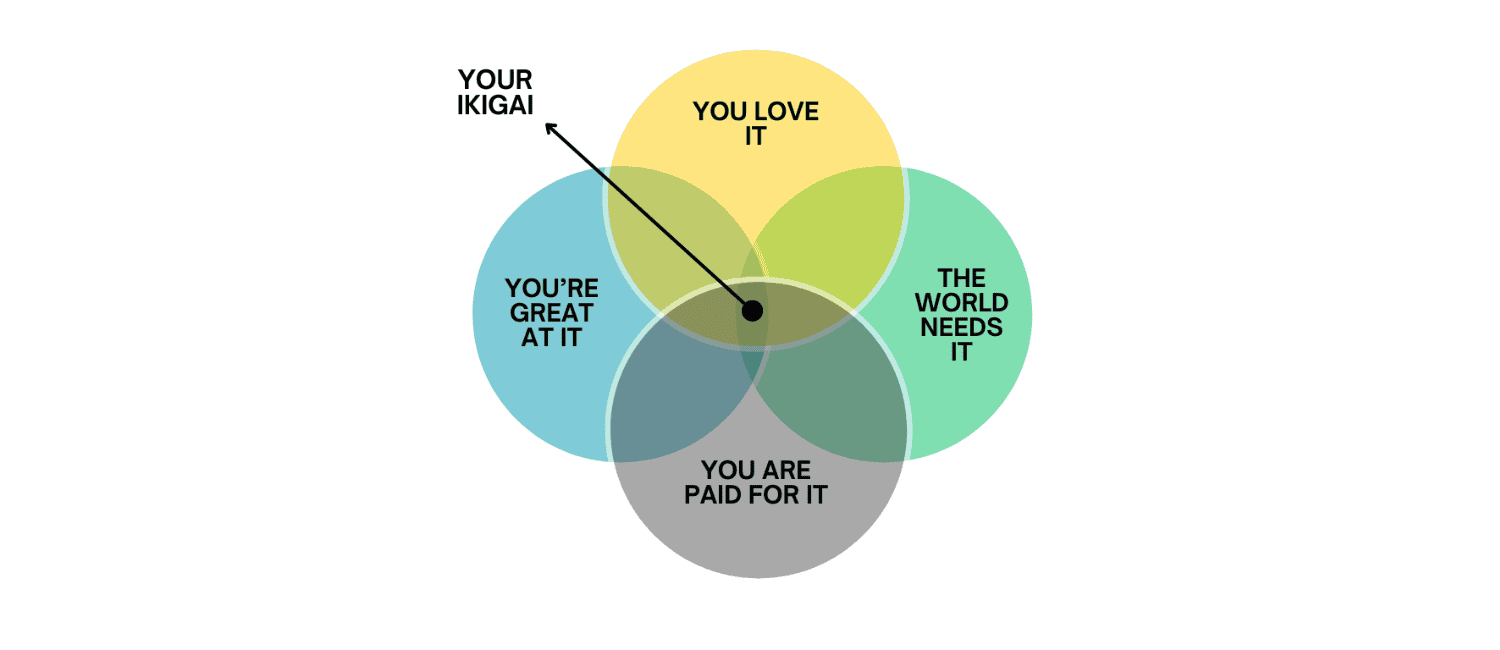Purpose. It’s a huge word.
As humans, our search for purpose is deeply embedded into our culture, psychology and emotion.
Throughout our lives, teachers, authors, artists, poets, philosophers, and even celebrities have told us the importance of finding our purpose.
There are now even apps and courses we can take to help us find our purpose.
But why is finding our purpose so important?
Psychology Today says purpose is what helps us feel fulfilled and happy. It provides meaning to everyday life; it can ground us and make our goals and ambitions worthwhile.
Purpose acts like an invisible compass, driving us forward. It influences our decisions, so we create our own paths, choices, stories, and success. It can even help us live longer.
But if purpose is the key to unlocking our potential, then how do we find it?
Lost and found
It can feel overwhelming to think about the purpose of our lives. Existential, even. It forces us to reflect on who we are, our decisions and ultimately, our happiness.
American poet Mary Oliver famously asked, “What is it you plan to do with your one wild and precious life?”
Finding the answer is often not easy.
Generally, no one wakes up and thinks, that’s it. I know my purpose. I understand what I must do to have a fulfilled and happy life.
With our cultural emphasis on finding fulfilment, purpose can instead be the difference between feeling lost or feeling found.
Many people struggle to feel any sense of purpose because it’s not something you’re necessarily given the tools to help figure out when you’re young. One study suggests that only a fifth of young people know their purpose.
Your life experiences will have a knock-on effect on whether you find your purpose, too.
Perhaps you didn’t do well at school. Or you were told you’re not smart or good enough to succeed at college. Maybe the right job never presented itself. Or you never discovered a subject or vocation to be genuinely passionate about.
This could mean going through life without feeling that vital sense of direction.
Purpose is not one-size-fits-all
Ultimately, purpose means something different to everyone.
Talk show host, producer, modern-day philosopher and author of The Path Made Clear, Oprah Winfrey, tells us that “purpose doesn’t have to be tied to your career.”
Purpose can instead be tied to a vocation, relationships, community, religion, caregiving and parenthood. It’s deeply personal and can encompass multiple aspects of life at the same time.
Purpose is very different from a goal. If a goal is a destination, like running a marathon, then your purpose is the reason for running the marathon in the first place.
The Harvard Business Review say that purpose should be meaningful to you but be of “consequence to the world beyond yourself.” It is somewhat tied to a greater good, whether micro or macro.
They say that finding your purpose requires reflecting on your actions, decisions and choices and aligning them with talents, values and goals.
So, let’s try it.
To do so, we’re going to travel to Japan. Buckle up; we could experience some turbulence of the self-reflection kind…
Voyage of discovery
The Japanese art of kintsugi involves repairing broken pottery by mending the breakage areas with gold leaf, silver or platinum to create something even more beautiful than the original.
The broken pottery is a good metaphor for our personal and professional lives. They can take knocks, become fractured, and need repair.
The Japanese practice of ikigai, which means finding joy through purpose, can help us fill the cracks to create a more fulfilled and valuable sense of self.
Ikigai is the path to our new enlightened, happy and fulfilled state.
Culturally, the Japanese believe everyone has an ikigai, but only those who want to find their ikigai will find it. This is not a half-measures process.
Ikigai can be found when you have a deep awareness of four different aspects of your life:
- Passion
- Vocation
- Mission
- Profession
Passion is simply what you love to do. It could be anything from cooking, playing basketball, listening to music, or writing short stories. It’s the things that genuinely make you happy.
Vocation is what you’re good at. It might include listening, helping people, managing people, painting or fixing things around the house.
Mission is what you think the world needs. It might be tempting to produce grand statements related to human rights or world peace here. Instead, drill down into minor, more manageable issues that feel more personal.
Profession is what you can get paid for. This is your career and skillsets. It’s what you do to pay those bills.
Think about it and write down your answers on a piece of paper. Don’t expect this to be an easy process. It requires you to open yourself up, be honest, be vulnerable, and discover what makes you tick.
Let your thoughts free flow, and then review and summarise them into a Venn diagram. See where your answers overlap and consider what activity fits in the centre.
 Importantly, your ikigai is not fixed. It can be ever-changing as you develop and evolve as a person. Think about it: what made you happy 15 years ago probably isn’t what makes you happy right now. Nutella doesn’t count.
Importantly, your ikigai is not fixed. It can be ever-changing as you develop and evolve as a person. Think about it: what made you happy 15 years ago probably isn’t what makes you happy right now. Nutella doesn’t count.
Six questions you can ask yourself
Digging into those four aspects of ikigai is challenging. To help, try answering these questions. Your answers will help you explore different parts of your life and uncover forgotten feelings and memories.
Again, be honest with your answers and be as non-judgemental and open as possible.
1. What activity did I enjoy as a child that I’d love to revisit?
This will tell you what you find fun. There is a purity and innocence to fun that often gets lost as we age.
2. What do I truly enjoy doing now?
Maybe you love playing football. But drill into what you enjoy about it. For example, is it the game you most enjoy, the winning, the sense of improvement or the sense of community?
3. If I didn’t care what others thought about me, I’d…
Your answers will highlight any insecurities you may have about yourself, activities that you’d like to try but never have, judgements you’ve made about yourself or negative experiences you can work on reframing.
Remember, if something scares you, it’s for good reason. But you’ll know what to work on.
4. How would I make one person’s life better?
The world’s problems are expansive. While you can’t solve them all, it’s beneficial to think about a particular situation you could solve. Think about someone you care about or know and what you’d do to improve their lives.
This will highlight areas that mean something to you – like education, mental health or poverty. It will also help uncover what you believe in and what you value.
5. Where would I go every day if I didn’t have to go to work?
As the phrase goes, there’s nothing more addictive than a monthly salary. This question aims to answer where you’d ideally like to spend your time. It should tell you what you’re passionate about and deem important.
6. I am inspired by…
Think about the people around you who inspire you. They might be parents, teachers or neighbours. You could also think about celebrities, public figures, artists, sportspeople or authors. Write down what you find inspiring about them, like their achievements or characteristics.
Now that you’ve completed the voyage of discovery, there is just one final question…
What’s your purpose?
How does it feel to find your purpose?
If you feel closer to finding your purpose, you may feel a tapestry of emotion.
Calm, the mental health app designed to help its users manage stress, sleep better, and live happier, describes finding your purpose as “finally seeing the sun break through the clouds after a long, grey day…It’s the moment of realisation and clarity where everything seems to fall into place, the world feels just ‘right’.”
We may feel more resilient once we know our purpose. We may feel inspired to reach our potential. And what used to feel mundane and boring may now feel purposeful.
We may experience a deep sense of fulfilment, happiness, satisfaction, confidence and greater physical and mental well-being. There may now be harmony between our actions, decisions, passions, values and interests.
Many feel inspired to turn their newly found passions and interests into purpose. For example, you could:
- Write short stories
- Enrol in a course to learn a new skill
- Create a fully sustainable household
- Research a bucket list travel itinerary
- Donate blood regularly
- Set up your own company
Turn your passion into purpose
Entrepreneurship has always been synonymous with purpose. Identifying your passion and purpose is essential for building a solid foundation as an entrepreneur.
Many describe being an entrepreneur as having ‘a calling’ and go on to turn their purpose into fully formed companies.
Many people in the UK have chosen to turn their passion into a business, even in just the last year. Companies House, the UK government’s company registrar, reported that 900,006 companies were formed in 2023, the highest number ever incorporated in a calendar year.
According to the New Startup Index from NatWest and Beauhurst, most of these new companies were online retailers, 49,000 new companies in the property letting space and 21,000 in the takeaway and street food sector.
That’s a lot of people and a lot of purpose.
Ready?
If you’ve been inspired by tales of ikigai or the story behind the barbershop owner in our video and are ready to turn your passion into purpose, 1st Formations would love to help.
We offer a range of company formation packages – all designed to get your limited company up and running in under 24 hours.
We’re on hand every step of the way with business advice, resources and encouragement. And while everything might feel impossible right now – don’t worry.
Because everything is impossible – until it isn’t.
Please note that the information provided in this article is for general informational purposes only and does not constitute legal, tax, or professional advice. While our aim is that the content is accurate and up to date, it should not be relied upon as a substitute for tailored advice from qualified professionals. We strongly recommend that you seek independent legal and tax advice specific to your circumstances before acting on any information contained in this article. We accept no responsibility or liability for any loss or damage that may result from your reliance on the information provided in this article. Use of the information contained in this article is entirely at your own risk.













Join The Discussion
Comments (2)
Excellent article! This article provided me with some purpose for my own expert financial advice UK business.
Thank you for your kind comment. We’re glad to hear you found it useful!
Kind regards,
The 1st Formations Team